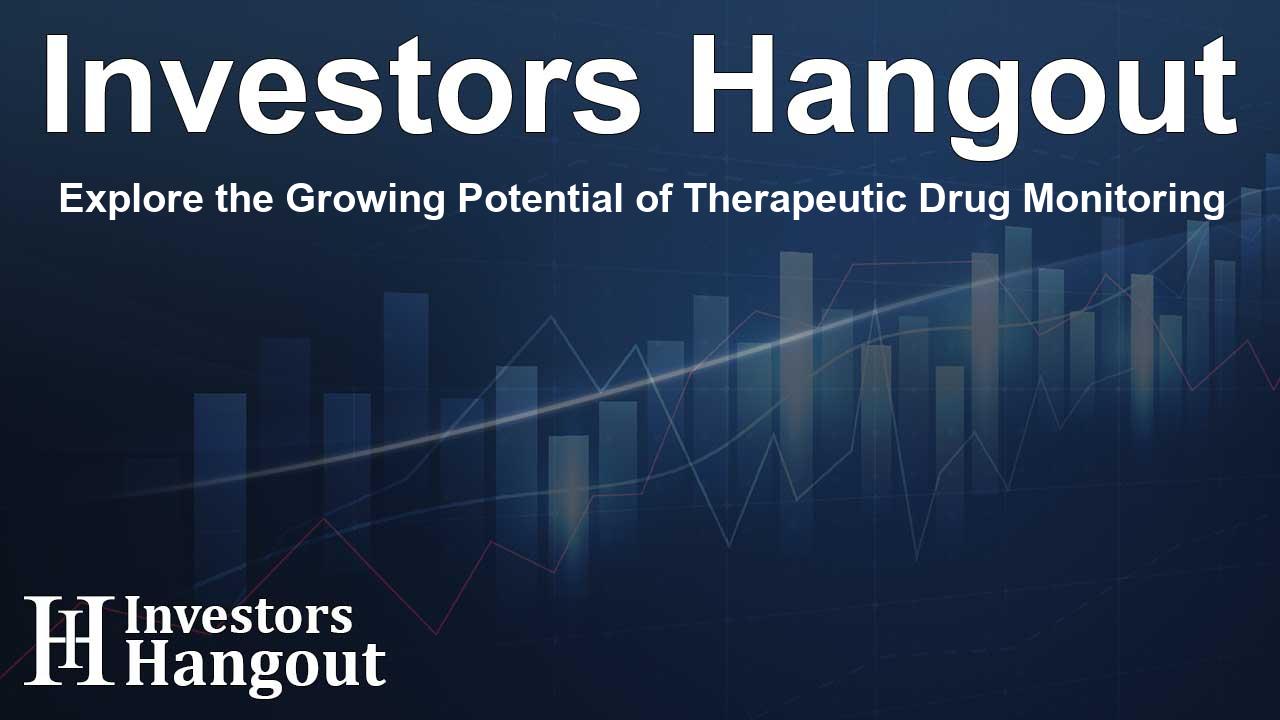Explore the Growing Potential of Therapeutic Drug Monitoring

Growth of the Therapeutic Drug Monitoring Market
The therapeutic drug monitoring (TDM) market is projected to expand significantly, reaching approximately USD 3.44 billion in the upcoming years, representing a compound annual growth rate (CAGR) of 8.4%. This growth is largely attributed to the rising rates of chronic diseases such as cancer and heart conditions which necessitate precise medication management.
Driving Factors Behind Growth
One of the primary factors fueling market expansion is the increased incidence of lifestyle-related diseases that require careful regulation of treatment through monitoring. Technological innovations like artificial intelligence and advancements in diagnostic tools, including chromatography and immunoassays, are also contributing to this growth. Combined with greater healthcare spending and a heightened focus on improving transplantation success rates and the implementation of precision medicine, these factors enhance the demand for TDM solutions.
Technological Innovations
Innovations in TDM technology, particularly those employing machine learning and AI, are revolutionizing how treatment plans are developed by allowing for real-time assessment and adjustments based on patient data. Non-invasive sampling methods, such as saliva-based testing, are also gaining traction, promoting improved patient compliance and convenience.
Segment Overview
The therapeutic drug monitoring market is categorized primarily by the types of technologies, notably immunoassays and chromatography coupled with mass spectrometry. In fact, immunoassays are expected to dominate this market due to their high sensitivity and efficiency, facilitating rapid and cost-effective results. Their integration into automated systems streamlines clinical practices, encouraging further investments in this technology.
Market Segmentation by Drug Class
Additionally, the market can be divided based on the drug classes monitored, which include immunosuppressives, antibiotics, psychoactive drugs, anti-arrhythmics, and particularly, anti-epileptic drugs. In 2023, the anti-epileptic segment is witnessing rapid growth, driven by the increasing prevalence of epilepsy and the necessity for careful monitoring to prevent toxicity. This segment is attracting investments in automated monitoring instruments and specialized immunoassays.
Key Players in the Market
Several prominent players are integral to the TDM market, including Abbott, Thermo Fisher Scientific, and F. Hoffmann-La Roche. These companies are heavily investing in research and development to enhance their product offerings and maintain competitiveness. For instance, Abbott’s diverse pipeline includes over 100 products aimed to keep pace with rising demand.
Abbott Innovations
Abbott has made significant strides in improving the accuracy and reliability of its diagnostic tests across various platforms. Their commitment to innovation is evident through consistent R&D investments and strategic restructuring aimed at enhancing their market position.
Thermo Fisher’s Expansion
Thermo Fisher Scientific remains a key player due to its extensive global network and its recent acquisitions aimed at broadening its diagnostic offerings. By acquiring Olink Holding AB, it enhances its capabilities in delivering advanced diagnostic solutions, especially in blood cancer detection.
Regulatory Landscape
The TDM market's future is also influenced by regulatory measures promoting companion diagnostics in the field of precision medicine. As regulatory frameworks evolve, the applicability and adoption of TDM practices are expected to increase, further driving innovation and market growth. The recognition of TDM's role in ensuring optimal patient outcomes will solidify its importance in clinical settings.
Conclusion
In conclusion, the therapeutic drug monitoring market is on an upward trajectory, supported by technological advancements and a growing recognition of the importance of precise medication management. As the industry evolves, continuous innovation and strategic investments by leading companies will play a crucial role in shaping the future landscape of TDM.
Frequently Asked Questions
What is therapeutic drug monitoring?
Therapeutic drug monitoring (TDM) is the process of measuring specific drug levels in a patient’s system to optimize their therapeutic effects while minimizing toxicity.
Why is the TDM market expanding?
The TDM market is expanding due to rising incidences of chronic and lifestyle-related diseases, advances in technology, and increasing investments in healthcare infrastructure.
Which technologies are prominent in TDM?
Immunoassays and chromatography-MS technologies are the most prominent in therapeutic drug monitoring due to their effectiveness and efficiency in detecting drug levels.
Who are the key players in the TDM market?
Key players include Abbott, Thermo Fisher Scientific, and F. Hoffmann-La Roche, all of whom are heavily investing in R&D to advance their TDM product offerings.
What is the future outlook for TDM?
The future of TDM looks promising, driven by innovations in technology and increasing regulatory support that prioritizes precision medicine in patient care.
About Investors Hangout
Investors Hangout is a leading online stock forum for financial discussion and learning, offering a wide range of free tools and resources. It draws in traders of all levels, who exchange market knowledge, investigate trading tactics, and keep an eye on industry developments in real time. Featuring financial articles, stock message boards, quotes, charts, company profiles, and live news updates. Through cooperative learning and a wealth of informational resources, it helps users from novices creating their first portfolios to experts honing their techniques. Join Investors Hangout today: https://investorshangout.com/
Disclaimer: The content of this article is solely for general informational purposes only; it does not represent legal, financial, or investment advice. Investors Hangout does not offer financial advice; the author is not a licensed financial advisor. Consult a qualified advisor before making any financial or investment decisions based on this article. The author's interpretation of publicly available data shapes the opinions presented here; as a result, they should not be taken as advice to purchase, sell, or hold any securities mentioned or any other investments. The author does not guarantee the accuracy, completeness, or timeliness of any material, providing it "as is." Information and market conditions may change; past performance is not indicative of future outcomes. If any of the material offered here is inaccurate, please contact us for corrections.